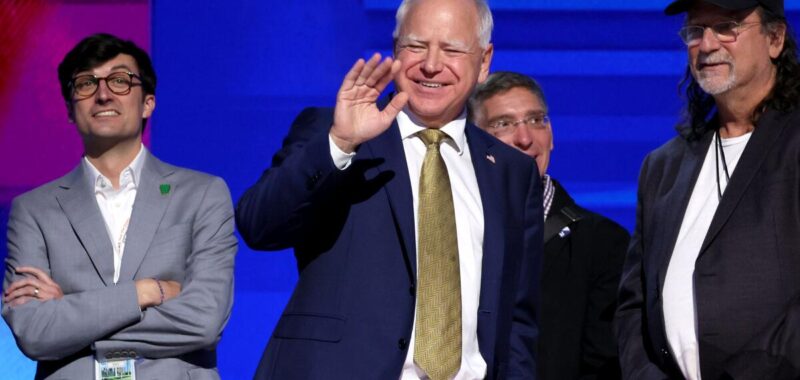
Minnesota Gov. Tim Walz, a former high school teacher from rural Nebraska, will speak to the biggest audience of his political career on Wednesday when he formally accepts the Democratic party’s nomination for vice president on the third night of the party’s convention in Chicago.
The speech will be a major test of Vice President Kamala Harris’ decision to choose the gregarious — and little-known — Midwestern governor as her running mate just 15 days ago, and the biggest chance yet for Walz to introduce himself to the nation.
Harris selected Walz after an intense, shortened vetting process two weeks after President Biden dropped out of the presidential race. His name emerged among other, better-known contenders from important swing states, including Pennsylvania Gov. Josh Shapiro and Sen. Mark Kelly of Arizona.
Although popular at home, Walz did not have much of a national profile until he critiqued Republican nominee Donald Trump and his running mate, Ohio Sen. JD Vance, as being “weird.” That one word proved surprisingly effective in confounding a former president known for name-calling, and it catapulted the blunt-speaking Walz into the national spotlight.
His speech is expected to focus on his rural upbringing and his time in the Army National Guard and as a public school teacher, football coach. It likely will be an attempt to drive home his oft-spoken desire to bring joy back into the nation’s politics in the face of what Democrats have described as Trump’s attempts to stoke fear and anger.
Walz will be preceded by former U.S. House Speaker Nancy Pelosi of San Francisco, and former President Bill Clinton.
Before being elected as Minnesota’s governor in 2018, Walz served six terms in Congress, representing southern Minnesota’s rural, Republican-leaning 1st District.
He served 24 years in the Army National Guard before retiring to run for Congress in 2005. Republicans — led by Vance, a Marine Corps veteran — have heavily criticized Walz’s service record, accusing him of abandoning his unit just before it was deployed to Iraq and of exaggerating his military rank for political gain.
Walz retired in May 2005, two months before his unit received orders to deploy to Iraq. He achieved the rank of command sergeant major, one of the Army’s highest enlisted ranks, but retired as a master sergeant because he did not complete the required coursework required to keep the higher title.
On Wednesday, the Trump campaign released a letter signed by 50 Republican lawmakers who are military veterans, criticizing him for for what they called “egregious misrepresentations” of his time in uniform.
Democrats have leaned heavily on Walz’s rural roots, lauding him as a counterpoint to Vance, whose political ascent began with his bestselling memoir, “Hillbilly Elegy,” which chronicles his impoverished upbringing in the Rust Belt and Appalachia.
The party has heartily embraced his persona — a Midwestern dad who hunts, doles out advice on fixing cars, brags about his tater tot hotdish recipe, and took the call from Harris asking him to be her running mate while wearing a camouflage baseball cap. (The campaign quickly began selling camo Harris-Walz hats, which sold out instantly.)
Speaking at the convention Tuesday night, former President Barack Obama joked about Walz’s wardrobe, saying “you can tell those flannel shirts he wears don’t come from some political consultant, they come from his closet, and they have been through some stuff.”
In the audience, Walz’s wife, Gwen, nodded heartily.

